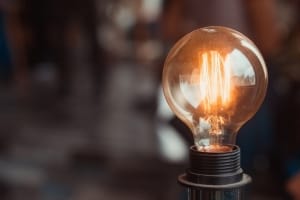
Stap 1: Verminder het elektrisch gebruik tijdens piekperiodes
Waarom is het belangrijk om het elektriciteitsverbruik tijdens de piekuren te verminderen? Piekuren zijn de momenten van de dag waarop het energieverbruik het hoogst is – meestal wanneer mensen thuiskomen en beginnen te koken, tv kijken, enz. Het elektriciteitsverbruik wordt sterk beïnvloed door het weer, met jaarlijkse pieken die gewoonlijk samenvallen met de warmste en koudste dagen van het jaar. In tegenstelling tot veel andere gebruikspatronen hebben energieverbruikers de neiging om verwarming en koeling rond dezelfde tijd in te schakelen, wat vaak tot lastige pieken in het stroomverbruik leidt. De prijzen van elektriciteit tijdens piekuren zijn hoger, aangezien de grote vraag extra druk legt op de huidige infrastructuur. Dit is de reden waarom u op uw elektriciteitsrekening kosten voor dal- en piekuren kunt zien. Het is voorlopig nog aangeraden om uw wasmachine, droger en vaatwasser ’s morgens of later op de avond te laten draaien. Let op, de afschaffing van het nachttarief komt eraan. Op dat moment zullen we weer gedwongen worden richting batterijen. Er kunnen ook andere, heel eenvoudige maatregelen worden genomen, zoals het uitschakelen van andere apparaten en verlichting wanneer ze niet nodig zijn. Vermindering van het sluimerverbruik is één van de makkelijkste manieren om uw stroomverbruik te verminderen. Sommige mensen zouden erg verschieten als ze de effectieve kost van hun sluimerverbruik zouden kennen.
Stap 2: Installeer zonnepanelen

Stap 3: Koppel uw zonnepaneelinstallatie aan een thuisbatterij
Na de installatie van uw zonnepanelensysteem kunt u uw factuur verder terugschroeven door ze te koppelen aan een thuisbatterij. Met deze combinatie kunt u de overtollige energie die tijdens zonnige dagen wordt geproduceerd, opslaan en naar behoefte gebruiken wanneer er geen zonlicht beschikbaar is of tijdens nachtelijke uren. Gemiddeld gezien heeft een Belgisch gezin een zelfconsumptie van ongeveer 30%. De overige elektriciteit die jouw zonnepanelen opwekken, wordt eerst op het net geïnjecteerd en op een ander moment weer van het net afgenomen. Door een thuisbatterij te plaatsen, verminder je jouw afhankelijkheid van het elektriciteitsnet. Zo behalen mensen met een thuisbatterij een zelfconsumptie van gemiddeld 55% tot 75%. Het exacte niveau van jouw zelfverbruik is afhankelijk van jouw verbruiksprofiel en van het vermogen van jouw zonnepanelen & thuisbatterij. Door het plaatsen van een thuisbatterij, verminder je dus je elektriciteitskost aanzienlijk. Een batterij heeft een terugverdientijd van 6 tot 10 jaar, afhankelijk van je profiel. Reken erop dat ze zo’n 20 jaar kan meegaan.
Stap 4: Vervang u oude verwarmingsketel door een warmtepomp
We zijn allemaal steeds meer op zoek naar manieren om op een duurzame manier te verwarmen. Dat is niet alleen goed nieuws voor het milieu en het klimaat, maar ook voor je energierekening! In tijden van EPB-normen, CO2-uitstoot, klimaatbetogingen, … stelt men zich weleens de vraag ‘ Is een warmtepomp wel beter voor het milieu? Jazeker! En dit op 2 vlakken. Ten eerste door een lager elektriciteitsverbruik. Bij een warmtepomp zal alleen de compressor elektriciteit verbruiken. Niet om warmte op te wekken, maar enkel om ze te comprimeren en over te dragen. Uw verbruik is dus lager en dat zal u merken op uw energiefactuur. Ten tweede op het vlak van luchtvervuiling. Een warmtepomp haalt haar warmte uit de omgeving. In tegenstelling tot verwarmingsketels, die hun warmte halen uit het verbranden van aardgas of stookolie. Daar komen tonnen CO2 bij vrij, terwijl een warmtepomp geen gram CO2 uitstoot. Om een optimaal rendement van de warmtepomp te kunnen garanderen, is een goede isolatie nodig. Zorg dus eerst en vooral voor een goed geïsoleerd huis. Doordat tot 75% van de nodige energie uit de directe omgeving gehaald wordt (lucht, water, bodem) en er maar een paar elektrische componenten (zoals compressor, circulatiepomp, ventilator,…) energie verbruiken, behoren onze warmtepompen tot de hoogste energie-efficiëntieklasses (tot A+++). Als je echt alles uit de kast wil halen, kan je je warmtepomp aansluiten op zonnepanelen. Zo wordt dan alle energie aangeleverd door de natuur. Prachtig toch! Beschik je nog over een oude verwarmingsketel? Hoe ouder een toestel wordt, hoe meer het rendement achteruit gaat en hoe meer energie het toestel gaat verbruiken. Bovendien wordt het risico op pannes en lekkages steeds groter. Als je verwarmingsketel ouder is dan 15 jaar of als hij 35% meer energie gaat gebruiken dan een nieuw model, dan wordt het tijd om de overstap naar een warmtepomp te overwegen.
Stap 5: Vervang oude inefficiënte huishoudelijke lampen en apparaten

We wensen je veel succes, en we hopen dat je alvast met één of meerdere stappen aan de slag kan gaan!






